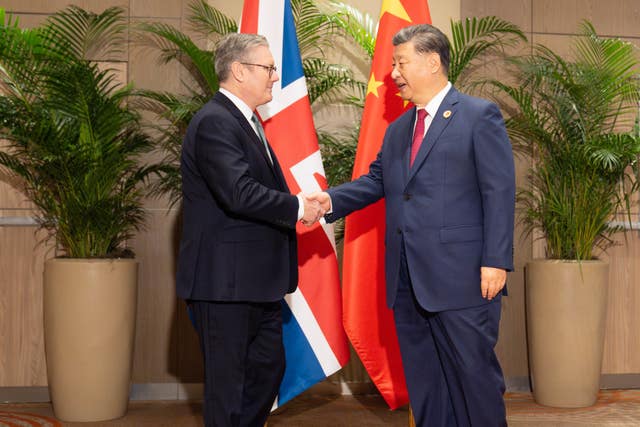
Vanessa Feltz 3pm - 6pm
11 January 2025, 14:14

Problems on the gilt markets have overshadowed the Chancellor’s trip to China.
Rachel Reeves has said she will “take action” to meet her fiscal rules following turbulence on the gilt markets.
Increases in the Government’s borrowing costs have sparked concern that the Chancellor will be unable to meet her debt and spending targets, requiring either tax rises or deeper spending cuts when she delivers a fiscal statement at the end of March.
Speaking to reporters in Beijing, where she is seeking to rebuild economic ties with China, the Chancellor declined to give a “running commentary” on the markets but insisted her fiscal rules were “non-negotiable”.
She added: “We will take action to ensure that we meet those fiscal rules”.
That action is reported to include deeper spending cuts than the 5% efficiency savings already pencilled in for the spending review due to be published later this year, while cuts to the welfare bill are also said to be under consideration.
The Chancellor has previously ruled out further tax rises after hiking taxes by £40 billion at the Budget in October.

The turbulence on the gilt markets, where yields reached their highest level since 2008 earlier in the week, has overshadowed the Chancellor’s trip, with opposition parties arguing she should have remained in the UK to address problems on the markets.
The visit, during which she met Chinese vice-president Han Zheng and vice-premier He Lifeng, is the first high-level economic meeting between Britain and China since 2019.
It follows Sir Keir Starmer’s own meeting with Chinese president Xi Jinping at the G20 late last year as Labour has pursued a thaw in relations with China following the more frosty tone set by the previous government.
At meetings on Saturday, Ms Reeves hailed the trip as a “significant milestone” in Labour’s re-engagement with China, saying she had agreed deals worth £600 million to the UK economy over the next five years.
Speaking after her meeting with Mr He, the Chancellor said: “The outcomes we have agreed today represent pragmatic co-operation in action.
“They represent common ground being found on areas like financial services, trade, investment and the climate.”
She added that “re-engagement” with China “already sets us on course to deliver up to £1 billion of value for the UK economy”.
The agreements reached on Saturday include deals on financial services, agri-food and cultural exports, along with other areas.
But she also emphasised that economic ties must not weaken national security, and said the two countries had “an obligation to be frank with each other where we disagree”.
As well as resetting relations with Beijing, the new Government has promised to “challenge” China where necessary, amid long-standing human rights concerns about the treatment of Uighur Muslims, constraints on freedoms in Hong Kong and its support for Russia’s war in Ukraine.

When asked by reporters in Beijing if closer ties to China carried any risk for the UK, Ms Reeves said: “We need to make sure we have a pragmatic and good relationship with countries around the world. That is in our national interest.
“It’s what our allies around the world do and it’s what I will be pursuing as Chancellor, always acting in the national interest while looking to help British businesses export overseas.”
After the meeting with Mr He, the Chancellor said she had raised issues of national security, along with Russia’s invasion of Ukraine and concerns about human rights in Hong Kong.
She said: “Not every conversation will be easy. However, it is essential and in the UK’s national interest that as two major economies the UK and China commit to building a stable, pragmatic bilateral relationship.”
The Treasury said Ms Reeves had explicitly raised the case of British national and pro-democracy activist Jimmy Lai, who has been detained in Hong Kong since 2020, as well as allegations of the use of forced labour in Xinjiang and the Chinese government’s sanctions against UK parliamentarians.
Meanwhile, opposition parties criticised the Chancellor for making the trip.
Shadow chancellor Mel Stride said she had “got her priorities badly wrong” and “absented herself on the far side of the world” while “her economic decisions here are pivoting us back towards the 1970s”.
Liberal Democrat deputy leader Daisy Cooper urged the Chancellor to “come back now to urgently address the ongoing crisis in the markets and announce a serious plan for growth”.